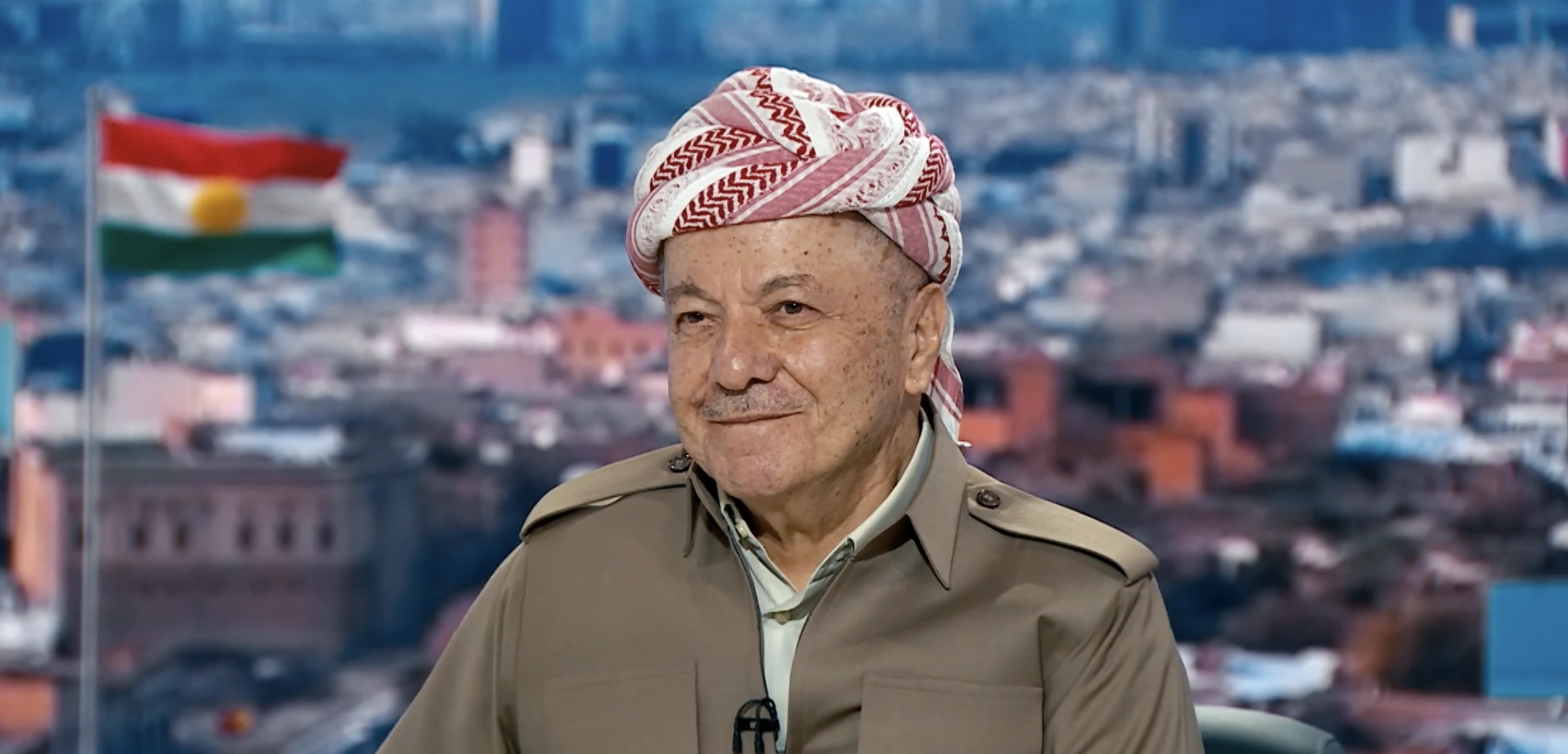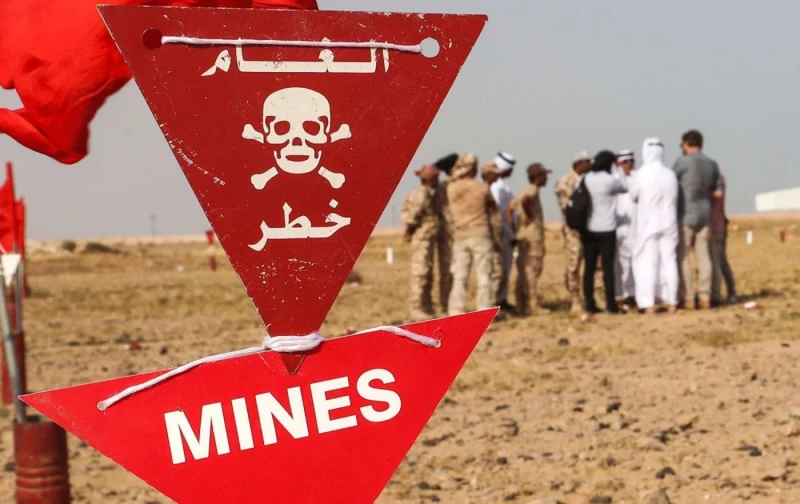ERBIL, Kurdistan Region of Iraq – The Kurdistan Democratic Party (KDP) is seeking to fundamentally reshape the Iraqi political system and safeguard Kurdish rights in Baghdad to prevent ill-actors from destabilizing the country, President Masoud Barzani said, days before the federal parliamentary vote.
Iraq is set to hold federal parliamentary elections on November 11, in a vote intensely contested by established parties in Baghdad, but one that is also expected to have very low turnout.
In an interview with Shams TV aired on Thursday, President Barzani said that his KDP considered boycotting the elections, citing an “unjust and unfair” electoral law “that is practically predetermined since the results are already decided.”
“We initially considered boycotting, then we noticed that many brothers and friends in Baghdad, including both Shiite and Sunni Muslims, have come to the conclusion that this law is indeed flawed. The current state of government is also unsuitable for Iraq and has not brought about any progress or development,” President Barzani said.
He further revealed that the KDP is seeking to form an alliance with “the forces that have toiled and struggled” in Baghdad, calling them the “genuine forces.”
As such, he defended his party’s participation in the upcoming vote, explaining that messages received from allies and “marginalized” forces in Baghdad indicate that serious efforts will be undertaken after the elections to “rectify” Iraq’s general situation and provide real reform.
“We will decide on alliances after the elections, with whom we will ally or cooperate,” he added, asserting that the KDP has no pre-existing allies with any entity in Iraq.
The KDP has largely centered its electoral campaign on enacting real reform in Iraq and protecting the Kurdish voice in Baghdad, arguing that the Iraqi constitution has been continuously violated and ill-intentioned actors have attempted to spread their wings over the Kurdistan Region.
In his election rallies, Kurdistan Region Prime Minister Masrour Barzani, who is also a deputy KDP leader, has reiterated that the KDP remains the only genuine voice of the Kurds in Baghdad, and that it seeks to protect the rights of all components in the country.
The KDP has also been vocal about its support for development in central and southern Iraq, and Prime Minister Barzani has stated that the KDP’s lawmakers in Baghdad will fight to promote infrastructure development and the provision of services in all Iraqi provinces.
“We want to provide a real opportunity to collaborate with other Iraqi forces willing to reform the situation, so that we can achieve what the Iraqi people desire,” President Barzani affirmed. “We hope for a million votes.”
President Barzani explained that during his meetings with delegations from southern Iraqi provinces, including Muthanna, Wasit, Maysan, Diwaniyah, and Basra, he was “surprised” that there are “no services” in the areas.
“They suffer from a lack of electricity and water. It is our duty to defend them, just as we defend the people of Erbil, Sulaimani, Kirkuk, or Duhok,” he asserted. “I advised the KDP candidates that they should represent every Iraqi province, not just the Kurdistan Region.”
Other forces, however, have not been so optimistic about Iraq’s political future. The National Shiite Movement, led by influential cleric Muqtada al-Sadr, is boycotting the vote. Sadr was the main victor of the 2021 parliamentary vote before withdrawing his 73 lawmakers due to repeated failed attempts at forming a “national majority” government.
“I wished that the Sadrist Movement and Mr. Muqtada al-Sadr would participate. I wished we could have done so, and it would have been better, but this is his decision,” President Barzani said.
In March, Sadr announced that his movement would boycott the elections, denouncing the process as corrupt and warning that Iraq was “taking its last breaths” under foreign influence and entrenched political forces.”
The KDP was an initial ally of Sadr after the 2021 parliamentary vote, prior to his withdrawal. It later allied with the Shiite-led Coordination Framework, along with the Patriotic Union of Kurdistan (PUK) and several Sunni parties, to form the government led by Prime Minister Mohammed Shia’ al-Sudani.
However, President Barzani lamented that several parties within the Coordination Framework remain hostile to the Kurdistan Region, without mentioning names.
“They tried hard to dismantle the Region. They attacked the Region, but this was all they could do,” he said, stressing that the Kurds have “developed an immunity” towards hostility and will “not remain silent and will not kneel” to oppressors.
“The Kurdistan Region will stand firm. It will not compromise on its rights, nor will it kneel to any demand or any act of aggression or injustice,” he affirmed.
President Barzani also touched on the security situation in Iraq, warning that the presence of armed groups threatens to destabilize the political process and the country as a whole.
“Everyone considers themselves a state within a state. We have mini-states within a state. Things have become chaotic,” he warned.
On Monday, Sudani said that Iraq’s efforts to bring all weapons under state control hinge on the US-led coalition’s withdrawal from the country, adding that a plan to have all coalition forces leave Iraq by September 2026 remains in place.
Although the PMF has been formally integrated into Iraq’s state forces, many of the armed groups operating under its umbrella continue to act with impunity and maintain strong ties to Iran. PMF-affiliated groups have also carried out attacks against the Kurdistan Region in recent years, most recently on its oil and gas facilities in July.
But President Barzani stressed that US-led coalition forces should remain in Iraq to prevent the return of the Islamic State (ISIS).
“The withdrawal of coalition forces from Iraq at this time paves the way for the return of ISIS. The factions’ weapons must not be politicized, and they should be within the framework of the constitution, the law, and the defense system,” he stressed, adding that Erbil wants the US-led forces to stay.
“We are not in favor of their withdrawal, to be clear,” he reiterated.
President Barzani also spoke about the Kurdistan Region’s progress, describing it as honorable and stating that Erbil is seeking further development “in all fields.”
“The regional government has very high ambitions, and what has been achieved is a source of pride and honor. We look forward to achieving more construction, development, and progress in all fields.”
President Barzani further lauded the Kurdistan Regional Government’s (KRG) landmark projects, including a round-the-clock electricity initiative quickly spreading to every corner of the Kurdistan Region, as well as water projects to alleviate severe drought and provide the Region’s citizens with clean drinking water.
“What has been achieved in Kurdistan is certainly appreciated by both Kurds and Arabs.”
Addressing problems in federal Iraq, President Barzani cited a “lack of will, planning, precise execution, and leadership” in Baghdad to ensure proper urban development.
“There’s real chaos with prices, stalled and faltering projects, and often these projects are used for personal enrichment rather than reconstruction,” said President Barzani. “Therefore, the obstacles are numerous: there’s no sound planning, no proper management, and no genuine will.”
After the fall of Saddam Hussein’s Baathist regime in 2003, the Kurds “exerted tremendous efforts to build a new Iraq,” according to President Barzani, who lamented that their desire was met with opposition by other Iraqi forces.
“We reached a point where it seemed as though the Region and the entire world were unwanted in Baghdad. Therefore, we removed ourselves from the process, not by choice but by circumstance,” he noted.
Speaking at a KDP election rally last month, President Barzani recalled the Kurds' struggle in shaping Iraq and the 2005 constitution and encouraged representatives to stand up for the oppressed.
The Kurdistan Region hosts a variety of ethnic and religious groups that have historically lived together in harmony, maintaining mutual respect even amid years of conflict and regional challenges.



 Facebook
Facebook
 LinkedIn
LinkedIn
 Telegram
Telegram
 X
X


